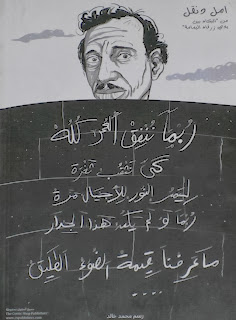Many readers of this page will be familiar with the Francophone literature of the Maghreb. More nuanced literary critics than myself may want to challenge the perception of this body of literature as a distinct category, but I get the impression that la littérature maghrébine d'expression française (109K+ results fro this string in Google) is generally seen as an established body of writing, with its own canon, and pantheon.
Despite Egypt's
insistence that the country belongs to the group of francophone countries, there are relatively few francophone Egyptian writes of note -- Robert Solé may be the most familiar name to readers in Europe, and though one may quarrel about his status as "Egyptian", let's count him as ibn al-balad ... sharafan. It may be true that French was
the language of the educated upper classes in Egypt for most of the twentieth century, and that the ability to speak French is still often associated with an aristocratic upbringing.
However, one can feel that the use of French in the Egyptian public sphere has decreased to the point of disappearance. A little over a decade ago in Alexandria and Cairo, it was possible to shop and order one's meals only in French, and many of the older shops retained their signs (or menus) in that language. Over the years, many shop assistants and waiters have retired or died, and old shops closed down altogether. Yes, there are still large French schools, but French in Egypt, it would seem, has become a foreign language.
The demise of French has been paralleled by a rise in the use of English. A particularly comic example is the Egyptian restaurant chain COOK DOOR -- a bowdlerization of "Coq d'Or", of course. But seriously: Egypt in the past decade has experienced the decay of the government education system, and an explosion in the number of private schools -- most of which appear to be مدارس لغات ('language schools'), i.e. schools in which part of the curriculum is taught in English. In the public sphere, shop signs are increasingly set in English only, English is understood in all but the most popular markets, and even the Arabic vocabulary of daily live has been heavily influenced by the language (what's the Arabic word for 'shoes'?).
I am not an expert in education, nor a linguist, so my notes are largely impressionistic. There is ample material, though, for several PhD theses in those fields, and I'd be curious to see detailed studies on the impact of English in Egypt.
This was a lengthy introduction to lead up to my main point: that there is now a relatively large number of young and educated Egyptians who use English daily with native or near-native competency. Setting aside the many (and often short-lived) English-language periodicals that publish miscellaneous articles, is an Anglophone Literature of Egypt anywhere in sight? Well, it seems that there is.
Susan Muaddi Darraj has written a brief
overview of Arab Anglophone writing that is useful as an introduction. There is also Syrine Hout's book-length study of Anglophone fiction from Lebanon that came out last year:
Hout, Syrine. Post-war Anglophone Lebanese Fiction: Home Matters in the Diaspora. Edinburgh University Press, 2012.
Then, there are local efforts here in Egypt to promote Anglophone writings by Egyptian authors. One of these is Rowayat, an online journal-cum-informational site. Depending on your perspective, subtitle can be read as sinister or promising (as in, a butterfly emerging from the chrysalis), but I feel that it describes the situation accurately. There is certainly no sudden explosion of Anglophone writing here, more a gradual emergence. The Rowayat site is well-structured, and contains some interesting material, but has been described and reviewed in detail
elsewhere. More to the point, I had an exchange of emails with Sherine Elbanhawy, the magazine's founder and manager. I asked her about her own background, and how she came to write in English:
"I am quadrilingual - Arabic, English, French and Spanish - Spanish is my weakest because I don't practice as much... .My education has been in English from the 10thgrade in high school, prior to that it was French. I read the most in English and I dream in English, so when I sit to write, that is the language I am most comfortable with. I believe English is my strongest language too."
But how about Arabic?
"I am very much an Egyptian, and proud to be, and love reading in Arabic as well, but Taha Hussein is for example too hard, and I indulge into the translation."
As an Arabist and someone who tries to study Arabic literature in the original language, I find these perceptions intriguing, and wonder how I would relate to my 'national' literature, if I preferred to read Goethe in English. I confess that I often cannot remember if I read a Latin American novel in German or English translation, but just retain a distinct impression of the work, like that of a smell. I'll leave the translation theorists to debate the topic, but I do think that Anglophone writing in Egypt (and the Middle East as a whole) will grow into a significant phenomenon. If you want to know more, follow Sherine.













